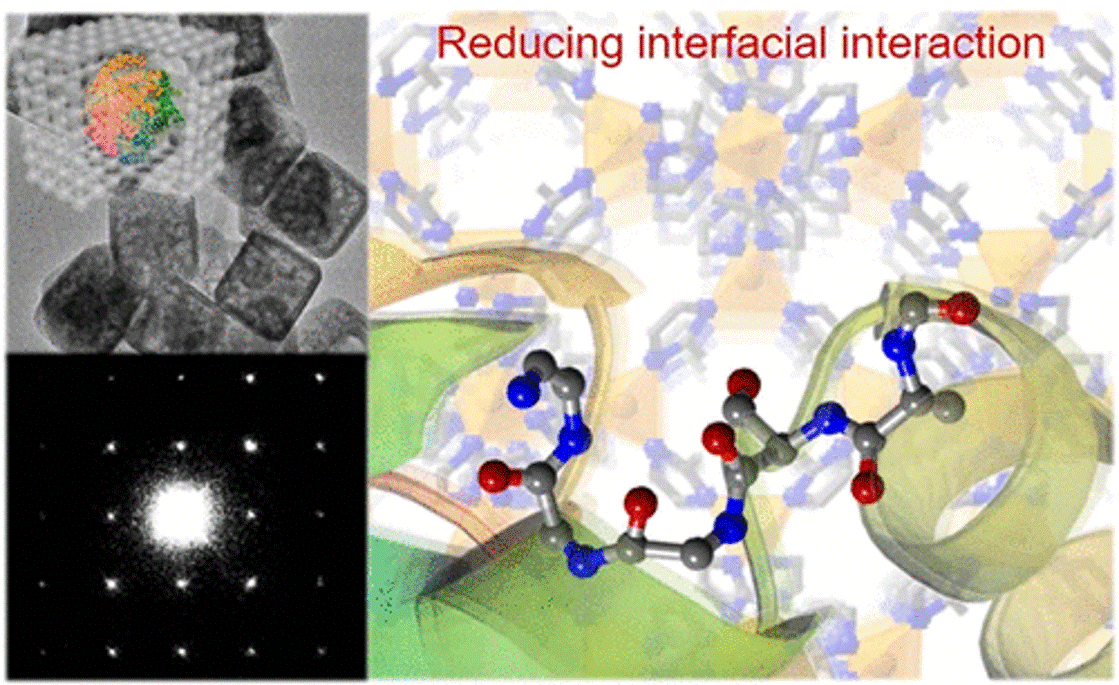
Our Nature Communications paper was highlighted by the Editor of "Organic Chemistry and Chemical Biology" in 2019.
Metal–organic frameworks (MOFs) are attractive for encapsulating enzymes for industrial purposes because they can increase selectivity, stability, and/or activity of the enzymes. Here, the authors developed an economical solid-state mechanochemical method to encapsulate enzymes during MOF synthesis.

Visiting Program in
Boston College & Hokkaido University
In order to explore and broaden student's horizons, our lab provides a very good opportunity for exchanging senior graduate students to the Department of Chemistry in Boston College, United States and Hokkaido University, Japan. Usually, we will send one or two students abroad every semester. Really welcome to join our lab!
Our works
The ultimate goal of our research is to generate novel biocomposites by combining biomacromolecules with Metal-organic Frameworks (MOFs) which acts as a porous matrix that can encapsulate enzymes, oligonucleotides, bacteria etc. Thus, those biocomposites are expected to show high-performance biological ability to respond to harsh environments in current industry applications.
The synthetic methods of biomacromolecules@MOFs biocomposites often em-ployed in our laboratory are the so-called “water-based and mechanochemocal approach or environmentally friendly system” technique. The water-based and grinding technique are unique polymerization routes that allow adjustment of the (a) morphology, (b) size, and (c) organization of the materials. The as-synthesized materials are investigated by means of X-ray powder diffraction, Nitrogen ad-sorption/desorption, thermalgravimetric analysis (TGA), scanning electron micro-scopy (SEM) or transmission electron microscopy (TEM) images, and biological activity analysis.

Selected Publication


Probing Interactions between Metal–Organic Frameworks and Freestanding Enzymes in a Hollow Structure
It has been reported that the biological functions of enzymes could be altered when they are encapsulated in metal–organic frameworks (MOFs) due to the interactions between them. Herein, we probed the interactions of catalase in solid and hollow ZIF-8 microcrystals. More...
Nano Lett. 2020

Rapid mechanochemical encapsulation of biocatalysts into robust metal–organic frameworks

Metal–organic frameworks (MOFs) have recently garnered consideration as an attractive solid substrate because the highly tunable MOF framework can not only serve as an inert host but also enhance the selectivity, stability, and/or activity of the enzymes. More...
Nat. Commun. 2019

Shielding Against Unfolding by Embedding Enzymes in Metal-Organic Frameworks via a de novo Approach

We show that an enzyme maintains its biological function under a wider range of conditions after being embedded in metal−organic framework (MOF) microcrystals via a de novo approach. More...
J. Am. Chem. Soc. 2017

Imparting Functionality to Biocatalysts via Embedding Enzymes into Nanoporous Materials by a de novo Approach: Size-Selective Sheltering of Catalase in Metal-Organic Framework Microcrystals

We develop a new concept to impart new functions to biocatalysts by combining enzymes and metal-organic frameworks (MOFs). The proof-of-concept design is demonstrated by embedding catalase molecules into uniformly sized ZIF-90 crystals via a de novo approach. More...
J. Am. Chem. Soc. 2015
Current Members
Advisor

PostDoc
Ph. D

Undergraduate

Graduate




















